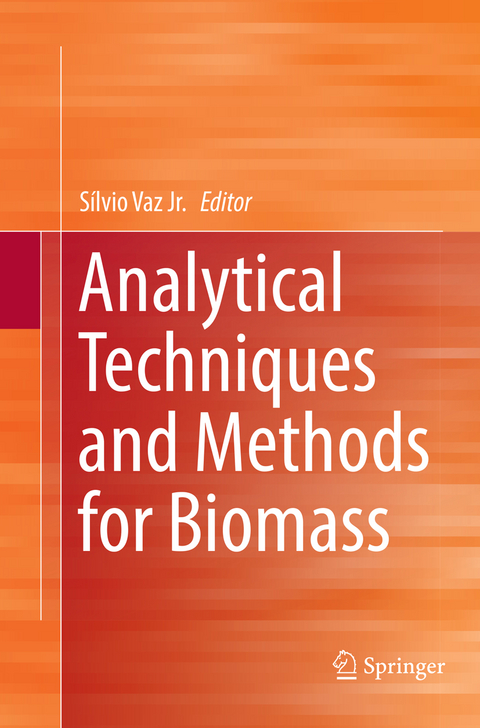
Analytical Techniques and Methods for Biomass
Springer International Publishing (Verlag)
978-3-319-82347-8 (ISBN)
This book deals with the application of techniques and methods of chemical analysis for the study of biomass and its conversion processes, aiming to fill the current gap in the book literature on the subject.
The use of various techniques and analytical methods is presented and discussed in a straightforward manner, providing the reader with the possibility of choosing the most appropriate methodologies for analysis of the major classes of plant biomass and its products.
In the present volume, a select group of international specialists describes different approaches to understand the biomass structure, their physical and chemical properties, the parameters of conversion processes, the products and by-products formation and quantification, quality parameters, etc.
Modern chemistry plays a strong economic role in industrial activities based on biomass, with an increasing trend of the importance of its application from the deployment of biorefineries andthe principles of green chemistry, which make use of the potential of biomass with decreasing impact negative environmental. In this context, analytical chemistry can contribute significantly to the supply chains of biomass, be it plant or animal origin; however, with the first offering the greatest challenges and the greatest opportunity for technical, scientific and economic progress, given its diversified chemical constitution. Thus, the chemical analysis can be used to examine the composition for characterizing physicochemical properties and to monitor their conversion processes, in order to obtain better products and uses of biomass.
The quality of the biomass used determines the product quality. Therefore, reliable information is required about the chemical composition of the biomass to establish the best use (e.g., most suitable conversion process and its conditions), which will influence harvest and preparation steps. Conversion processes should be monitored fortheir yield, integrity, safety, and environmental impact. Effluent or residues should be monitored and analyzed for environmental control. Co-products need to be monitored to avoid interference with the product yield and product purity; however, co-products are also a good opportunity to add value to the biomass chain. Finally, products need to be monitored and analyzed to determine their yields and purity and to ensure their quality. In this context, analytical chemistry can contribute significantly to the biomass supply chains, be it of plant or animal origin.
Prof. Dr. Sílvio Vaz Junior holds a BSc degree in Chemistry, a MSc degree in Physical Chemistry and a PhD degree in Analytical Chemistry from University of São Paulo. He was director and partner of two analytical private laboratories related to environmental analysis technologies. Since 2010, he is a research scientist at the state-owned Brazilian Agricultural Research Corporation (Embrapa) working on the development of renewable chemicals from biomass and analytical chemistry applied to bioenergy and biomass chemistry. He is a member of IUPAC and has published articles and books related to renewable chemistry and analytical chemistry.
Chapter 1 The Use of Analytical Chemistry to Understand the Biomass.- Chapter 2 Qualitative and Quantitative Analysis of Lignins from Different Sources and Isolation Methods for an Application as a Biobased Chemical Resource and Polymeric Material.- Chapter 3 Analyses of Biomass Fibers by XRD, FTIR and NIR.- Chapter 4 Molecular Properties and Functions of Humic Substances and Humic-like Substances (HULIS) from Biomass and their Transformation Products.- Chapter 5 Mass Spectrometry for Metabolomics and Biomass Composition Analyses.- Chapter 6 Analysis of Biomass Products by Nuclear Magnetic Resonance.- Chapter 7 Microscopy Applied in Biomass Characterization.- Chapter 8 Analytical Strategies Using Chromatographic Methodologies to Analyze Lignocellulosic Feedstocks and their Value-added Compounds under Biorefinery Processes.
| Erscheinungsdatum | 05.03.2022 |
|---|---|
| Zusatzinfo | XI, 280 p. 82 illus., 42 illus. in color. |
| Verlagsort | Cham |
| Sprache | englisch |
| Maße | 155 x 235 mm |
| Gewicht | 4453 g |
| Themenwelt | Technik ► Elektrotechnik / Energietechnik |
| Schlagworte | Biomass chemical analysis • Biomass chemistry • Biorefineries • Characterization of biomass • Extraction of natural products • Green chemistry • Lignin characterization • natural resources and energy economics |
| ISBN-10 | 3-319-82347-7 / 3319823477 |
| ISBN-13 | 978-3-319-82347-8 / 9783319823478 |
| Zustand | Neuware |
| Haben Sie eine Frage zum Produkt? |
aus dem Bereich


